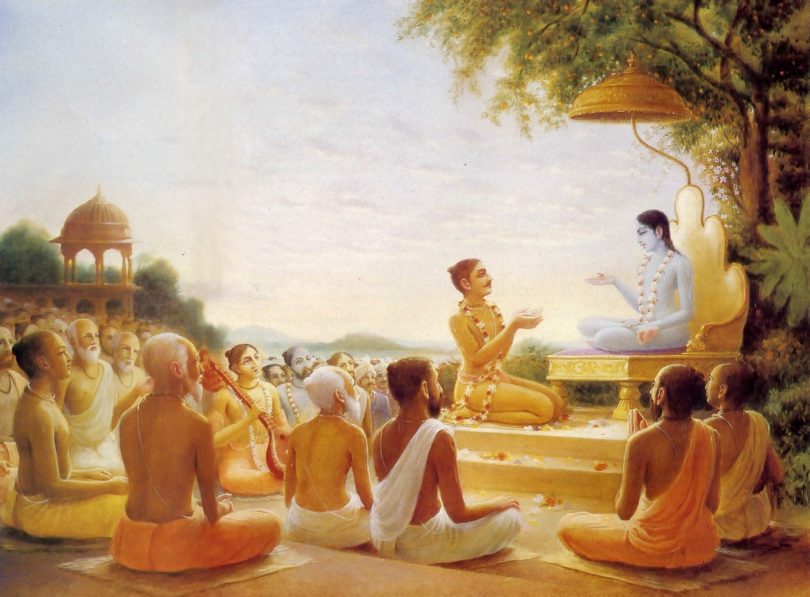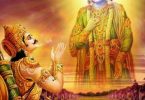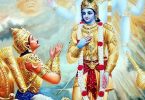Question:
Srimad Bhagavatam 1.4.4
tasya putro mahä-yogé
sama-dåì nirvikalpakaù
ekänta-matir unnidro
güòho müòha iveyate
“His [Vyäsadeva’s] son was a great devotee (mahä-yogé), an equibalanced monist whose mind was always concentrated in monism. He was transcendental to mundane activities, but being unexposed, he appeared like an ignorant person.”
- In this verse it is mentioned that Sukhadeva Goswami is a monist. I am not able to understand how this can be so. How can he be a monist or brahmanvadi? Brahmavadis don’t have complete realization of Lord and they don’t believe in the form of Lord.
But I have heard that Sukhadeva Goswami was previously the parrot of Radharani and he came out of the womb of his mother only after the Lord assured him that maya would not touch him. If he knows about the Lord and His energies and is a self-realized soul – an associate of Lord – how can he initially be a monist or brahmavadi?
- Secondly in this verse it is mentioned he is “a maha yogi” which Srila Prabhupada translated as a great devotee. So how can he be great devotee and monist at same time?
Answer by Romapada Swami:
Before we begin, just a quick correction – the name is not Sukhadeva Gosvāmī – a common mis-pronunciation. It is Śukadeva Gosvāmī (शुकदेव गोस्वामी, not सुखदेव गोस्वामी). For e.g. Sukhadeva (सुखदेव) was the name of an Indian freedom fighter who gave his life along with Sardar Bhagat Singh. That is not the same as Śukadeva – the speaker of Śrīmad Bhāgavatam. In Sanskrit, śuka literally means parrot, whereas sukha means happiness. There is a vast difference.
Sanskitists have developed a nice format to write Sanskrit using a slightly modified Roman alphabet. This is called IAST. Please refer to this link for more information. All BBT publications use this format.
https://en.wikipedia.org/wiki/International_Alphabet_of_Sanskrit_Transliteration
Also almost every major BBT publication has a Sanskrit Pronunciation Guide at the end. The printed version of Bhagavad Gītā As It Is certainly does have it (not online versions). It shows how to write, read, and pronounce Sanskrit written in IAST.
- SB 1.4.4 does not state that “Sukhadeva Goswami is a monist”. It states that he WAS “an equibalanced monist, whose mind was always concentrated in monism.” More details will be provided in Addendums as a reply to this question; however, essentially, he became a great devotee (from his previous ‘monist’ position) on the strength of awakening his attraction to the personal feature of Krsna by hearing narrations about Him.
You added that you have heard that “Sukhadeva Goswami was previously the parrot of Radharani”. There are two diametrically opposing views on whether or not Sukadeva Goswami actually was previously Radharani’s parrot. These opposing views can be found in Addendums. A reply to the 2nd part of this first question has already been stated.
Addendums here:
Is Sukadeva Gosvami a Radharani’s parrot? – Hari Parshad das
Is Sukadeva Goswami a Radharani’s parrot? – Amarendra das
- The two positions (his being a great devotee and his being a monist) were not manifest in his character at same time. They were sequential, as described above.
Below are several points that form a combined answer to both questions above.
Now to the main points:
- Firstly, a monist cannot be exclusively translated to a brahmavādī. Śrīla Prabhupāda’s synonyms and translation do not use the word brahmavādī. Even a pure devotee is a monist since he sees the The Supreme Lord within all living entities, even within his enemies.
- The Sanskrit word that Śrīla Prabhupāda translated as monist is nirvikalpakaḥ. Śrīla Śrīdhara Svāmī writes about nirvikalpakaḥ in his commentary to SB 1.4.4 – samadṛk samaṁ brahma paśyati. ato nirvikalpakaḥ. svārthe kaḥ. nirasta bhedaḥ. This means that a nirvikalpakaḥ is a person who sees everything and everyone equally. He does not judge anyone based on material criteria. This is very true even for a devotee of Śrī Kṛṣṇa. In Śrī Bhaktirasāmṛta Sinduḥ (BRS) 1.1.28 Śrīla Rūpa Gosvāmī says that Bhakti Devī bestows four kinds of auspiciousness (śubhadā). The first two are – prīṇanaṁ sarva and jagatām anuraktatā i.e. a devotee develops affection for all living entities, and the devotee becomes affectionate to all living entities. Thus, even devotees are equanimous and non-judgemental to all living entities.
- Secondly, it is not true that *all* brahmavadis do not have complete realization of the personal feature of the Lord. They may have such knowledge and may believe it to be true, but may be attracted to the impersonal brahman feature of the Supreme Absolute Truth instead of the personal feature.
- We must also look at the entire context of verses spoken by sage Śaunaka in his inquiry about Śukadeva Goswāmī. When Sūta Gosvāmī arrived at the Naimiśāraṇya where he met Śaunaka r̥si, the Srīmad Bhāgavatam had already been spoken by Śukadeva Gosvāmī. So the identity of Śukadeva Gosvāmī was already established as a perfect devotee of Lord Śrī Kr̥ṣṇa. That is why in SB 1.4.2 Śaunaka r̥si refers to Śukadeva Gosvāmī as bhagavān. So one should not take a single verse in isolation, and try to understand the identity of Śukadeva Gosvāmī just from one verse. A more complete and thorough understanding will reveal his true and complete identity. The following points attempt to do just that.
- SB 1.4.4 mentions that Śukadeva Gosvāmī was a hidden personality, externally appearing like a fool. The hidden nature of Śukadeva Gosvāmī was such that he appeared like a brahmavādi externally. But internally he was a pure devotee of the highest level. The most celebrated 3rd mangalacarana verse of Śrimad Bhāgavatam (SB 1.1.3) speaks of the glories of Śrīla Śukadeva Gosvāmī. It speaks how Śukadeva Gosvāmī made the Śrīmad Bhāgavatam even more tasteful by his narration. From this verse the only conclusion that one can draw about Śrīla Śukadeva Gosvāmī is that he is remotely distant as possible from a brahmavadi. Śrīla Śukadeva Gosvāmī was a pure rasika devotee.
- From SB 1.2.2 it may appear that Śukadeva Gosvāmī was an impersonalist, and left home as soon as he was born. But there is a special significance of the trees echoing to Śrīla Vyasadeva in a mood of separation. Śrīla Jīva Gosvāmī and Śrīla Viśvanātha Cakravartī Thākura both describe in their commentaries to SB 1.2.2 that the trees were attracted to Śukadeva Gosvāmī and let him enter their minds. Thus when the trees echoed back to Śrīla Vyāsadeva, it was Śrīla Śukadeva Gosvāmī who was actually responding with feelings of separation to his father, via the medium of the trees. This also shows the personal nature of Śrīla Śukadeva Gosvāmī. Much is to be learnt and relished from the commentaries of the previous ācāryas.
- Even if one considers that Śrīla Śukadeva Gosvāmī was initially a brahmavādī (not māyāvādī; there is a huge difference – not going into that topic as it is out of scope of this document), then by mercy of a pure devotee or the mercy of Lord Himself (as in the case of the 4 Kumāras when they smelled the fragrance of Tulasī leaves from the lotus feet of Lord Viṣnu), such transcendentalists immediately become pure devotees. This is described by Lord Śrī Caitanya Mahāprabhu in CC Madhya Chapter 24 – The Sixty-One Explanations of the Ātmārāma Verse. Upon hearing the Śrīmad Bhāgavatam from his father Śrīla Vyāsadeva who was a pure deovtee, Śrīla Śukadeva Gosvāmī got carried away by hearing the pastimes of the Lord, and himself became a pure devotee (CC Madhya 24.46-48, which includes reference to SB 2.1.9 and SB 12.12.69). The famous ātmārāma verse SB 1.7.10 describes the pure devotional nature of Śukadeva Gosvāmī.
- In BRS 1.2.265 Śrīla Rupa Gosvāmī states Śrīla Śukadeva Gosvāmī as a pure devotee who exemplified the śravanam process among the nine processes of bhakti (SB 7.5.23-24).
- In SB Canto 1 Chapter 19 the pastime of the appearance of Śrīla Śukadeva Gosvāmī is described while Mahārāja Parīkṣit was in the company of so many other exalted sages that had arrived from all over the universe, such as Nārada, Bhṛgu, Viśvāmitra, Aṅgīra, Devala, etc. (SB 1.19.9-10). When Śukadeva Gosvāmī arrived all these sages paid their respects to him. (SB 1.19.29-30). The sheer degree of respect offered by these most exalted sages, especially Nārada Muni who is a pure devotee of the highest level himself, to Śrīla Śukadeva Gosvāmī should leave no doubt in anyone’s mind that Śrīla Śukadeva Gosvāmī was considered a pure devotee of the highest caliber by all these sages.







